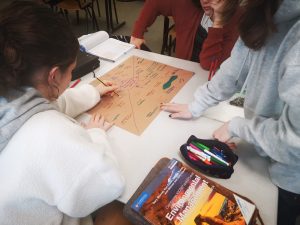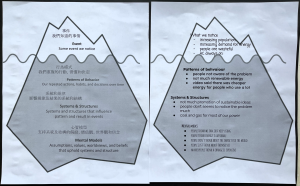Cultivate connection:
- Demonstrate care and compassion for other living things through your world and actions.
- Care for yourself and foster your inner relationships to develop a strong sense of being.
- Connect with others to collaborate for positive impacts on our community and the broader world.
In the social media era, it’s easy to feel connected. Apps have created specific ads and for you pages to help you see the content you enjoy and react to. You may have thousands of Facebook friends, Instagram followers, and TikTok followers. Yet, as a society, we feel so disconnected from each other as we’ve forgotten about the importance of building meaningful connections with ourselves, our communities, and the world. When we think about cultivating connection in the sense of Compass Education’s ‘Sustainable Habits of Minds,’ we need to remember it’s about deep, meaningful connections that show care, compassion, and have positive impacts on the people and world around us. We can use Compass Education’s Sustainability Compass to help guide us by looking at connections to our Wellbeing, Society, Nature, and Economy.
To cultivate connections with others, the first place you need to look is within and at our own wellbeing. As you hear on every plane ride, “put on your own oxygen mask before helping others.” As educators and advocates for a sustainable world, we so often give everything we have to others, but when thinking about cultivating connections, we need to care for ourselves first. Unless we are healthy and have positive energy in our own lives, we will have a difficult time cultivating true meaningful connections with others. Some things you can do to care for yourself would be to do an activity you loved as a child but no longer have time for, go for a walk in nature, get coffee with a friend, journal, see a therapist, or spend time doing something you love. For me, caring for my own body and mind means moving my body. I often care for myself by going on bike rides, playing basketball, or going on a walk with a friend. When I take the time to care for myself and remember to foster my own inner relationships, I’m reminded how this makes me better to be ready to connect with others.
Another important part of cultivating connection is collaborating for positive impacts on our community and the broader world thinking in terms of society. When we think about making a positive impact on our community, we really need to think about the communities we live in. While I was living in Bangladesh, I was looking for ways to be active, and I came across an organization called Deshi Ballers. Deshi Ballers was founded by two former Bangladesh national basketball team players who wanted to give others the chance to be able to play basketball. It started off first by just playing and helping coach their teams at various tournaments, but we quickly learned that Deshi Ballers was capable of making an even larger impact. Together, we worked to create a book titled Pass it to Rizwana that shared the stories of many girls in Bangladesh and their fight to play basketball. By putting their stories into writing, we were then able to work together with the Bangladesh Government and UNICEF to share the stories with children all around Bangladesh and make basketball a priority sport in Bangladesh for the first time. What started as a way to connect through basketball turned into a life changing experience where we were able to make a positive difference in our local basketball community and Bangladesh. You may be wondering, how can I collaborate with others for positive impacts in our community? There are so many small ways to get involved and work with others to create positive impacts in your community. Using the Systems Iceberg is a great place to start to think about ways you can help your specific community. You could also volunteer monthly at a soup kitchen, organize a forest clean up, volunteer to coach a local sports team, or tutor a student. If you find something that brings you joy and you’re able to share it with others, you’ll be building connections that will last and create positive impacts in your own community and beyond.


Along with making connections with ourselves and other people, it is also super important to demonstrate care and compassion for other living things thinking in terms of nature. We often take nature for granted, but it’s important to show care and compassion for it. We can do this by getting out to the nearest forest and going for a walk, recycling as often as we can, reducing food waste, or embracing a minimalist lifestyle. By thinking and caring about the world around us, we are better able to protect nature and allow nature to live on for generations. In the social media era, nature isn’t really protected as we are influenced to follow a consumerism culture. Our economy often drives our decisions, and we are constantly being influenced to have the latest and greatest items at the cheapest price. However, it is important when cultivating connections to connect with the world around us and work towards making meaningful connections with nature.
Cultivating connections means to connect deeply with yourself, others, and the world around you. How can you embrace cultivating meaningful connections to make a positive impact on the people and world around you?


Author

Crystal Pottebaum
Crystal Pottebaum is a dedicated teacher, author, and life-long learner. She has taught high school Spanish, Grade 3, Grade 4, and is currently serving as a PYP Service and Sustainability Coordinator. Crystal has a Master’s Degree in Education specializing in Curriculum and Instruction from the University of Kansas and a Bachelor’s Degree from University of Northern Iowa in Elementary Education and Spanish Teaching. She has worked in the United States, Nigeria, Bangladesh, and Hungary. Crystal has a passion for serving others and leading a sustainable life. While in Nigeria, her students designed and constructed a tire playground for a local school. In Bangladesh, Crystal wrote a book titled Pass it to Rizwana and helped many women and girls gain access to sports. Crystal enjoys using Compass Education in her classroom and helping children take action in their communities and become life-long change-makers. In her free time, you’ll find Crystal playing sports, hiking, baking, or writing.






